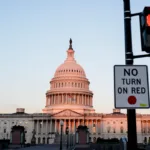By Joseph Lord and Nathan Worcester
WASHINGTON—The House of Representatives is voting on a legislative package to fund the government as Washington stands on the precipice of ending the longest government shutdown in U.S. history.
The vote series started at around 6 p.m. ET, with the final vote expected around 8 p.m. ET.
Aside from punting government funding to Jan. 30, 2026, and thereby ending the 43-day shutdown, the package the House is considering would fully fund three sectors of government.
If it’s passed by the House, it will head to the White House for final signature by President Donald Trump, who’s expected to sign the bill.
Ahead of the vote, House Speaker Mike Johnson (R-La.) promised members that the lower chamber would take up legislation to reverse a controversial provision of the bill that allows senators whose phone records were pulled without their knowledge to sue the government.
The provision relates to subpoenas issued under President Joe Biden which were related to the investigation into efforts to challenge congressional certification of Biden’s 2020 election victory.
The provision was criticized by Republicans including Rep. Morgan Griffith (R-Va.), who said during a House Rules Committee hearing on the package that he agreed with Democrats’ skepticism about that portion of the text.
Rep. John Rose (R-Tenn.) also spoke against the Senate provision during a speech on the House floor.
He agreed with many other Republicans that President Joe Biden’s Department of Justice (DOJ) had overreached in their investigations into the 2020 election and Jan. 6 Capitol breach, but said the measure was nevertheless inappropriate.
“No elected official should profit from the political calculations of left-wing bureaucrats and judges,” Rose said, adding that it is “shameful” to ask American taxpayers to finance the measure.
Speaking to reporters on Wednesday, Johnson said that he was “surprised” by the Senate bill provision, noting that many in the House “have a strong opinion about it.”
During the House Rules Committee hearing, which went into the early hours of Wednesday morning after being gavelled in at about 6:30 p.m. local time on Tuesday, the panel voted 8–4 to advance the legislation.
Democrats are expected to broadly oppose the measure, meaning its success will largely come down to the cohesion of the Republican conference, which is expected to pass the bill.
Rep. Victoria Spartz (R-Ind.)—who, along with Rep. Thomas Massie (R-Ky.), opposed an earlier version of the spending bill in September—will back the bill, her spokesperson told The Epoch Times in an email.
“We need to open the government, pay our military, and provide essential services. This [continuing resolution] doesn’t increase spending or set us up for a Christmas omnibus, so the congresswoman supports it,” the spokesperson said.
It will be the first vote cast by the newly sworn-in Rep. Adelita Grijalva (D-Ariz.), whose swearing-in was delayed due to the government shutdown. She would provide the final signature for a discharge petition to require the DOJ to publicly release files on the case of billionaire sex predator Jeffrey Epstein.
Grijalva was sworn in shortly before the vote.
The Rules Committee hearing marked the House lawmakers’ first time back on Capitol Hill for official business in eight weeks.
House Speaker Mike Johnson (R-La.) had adjourned the session following the House’s passage of a stopgap funding bill, though some House lawmakers stuck around Washington throughout the shutdown.
That extended adjournment was criticized as a “paid eight-week vacation” by Democrats at the Rules Committee hearing, who said that Republicans should have followed the Senate in staying in Washington during the shutdown.
A key issue throughout the shutdown centered on health care, the driving issue behind the shutdown.
Democrats have been calling for a one-year extension of tax subsidies for Affordable Care Act (ACA) policies, which are due to expire at the end of this year.
Some experts have warned that the lapsing of these subsidies could cause drastic increases in the premiums for ACA policies.
Several Democrats on the Rules panel and later in remarks on the House floor reported personally hearing from their constituents who are facing premium increases of several thousand dollars next year.
House Minority Leader Hakeem Jeffries (D-N.Y.) on Tuesday evening called for an amendment to extend ACA subsidies by three years. The measure failed, as did other efforts by Democrats to attach ACA subsidy extensions to the package.
The Senate passed the funding bill on Nov. 10, with seven Democrats and one independent joining all Republicans but one. Those were Sens. Jacky Rosen (D-Nev.), Catherine Cortez Masto (D-Nev.), Tim Kaine (D-Va.), John Fetterman (D-Pa.), Maggie Hassan (D-N.H.), Jeanne Shaheen (D-N.H.), Dick Durbin (D-Ill.), and Angus King (I-Maine), who caucuses with the Democrats.
None are up for reelection in 2026. While some are on pace to face reelection bids later, both Durbin and Shaheen are retiring.
Sen. Rand Paul (R-Ky.) voted against the bill.
The legislation funds the government through Jan. 30, 2026.
It also includes three full-fiscal-year appropriations bills to fund the Department of Agriculture, the Department of Veterans Affairs, and the Food and Drug Administration through Sept. 30, 2026. This includes funds for the Supplemental Nutrition Assistance Program and the Special Supplemental Nutrition Program for Women, Infants, and Children.
The measure reverses cuts made to the federal workforce during the shutdown. Those employees will receive back pay.
Jackson Richman contributed to this report.





